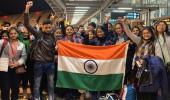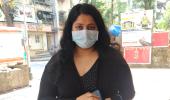Of the 18,000 medical students who returned to India last year, 5,000-7,000 have either shifted to universities in Georgia, Russia, Serbia, Uzbekistan, Kyrgyzstan, Kazakhstan and Moldova or are in the process of seeking a transfer to those.

Until a year ago, Nilofer D'Souza (name changed on request) was studying medicine at the Bogomolets National Medical University in Kyiv, Ukraine. And then Russia invaded.
The aspiring doctor was among the thousands of Indian students who fled the war-torn country and returned home.
The year has since gone by in a haze of uncertainty.
The 21-year-old, Ahmedabad-based, fourth-year undergraduate medical student is now looking to get transferred to a university in Georgia. It's not going to be easy, though.
Just the tuition fee will cost her an additional Rs 200,000-Rs 400,00- and she'll have to shell out at least 150 per cent more on accommodation, she says.
That's just one part of it.
"Most of us will also have to repeat at least one semester," D'Souza says.
"In some colleges and countries, it is as long as a year. But the lack of practical classes and the uncertainty around our future are forcing us to take our chances."
The Parents' Association of Ukraine MBBS Students (PAUMS) estimates that of the 18,000 medical students who returned to India last year, 5,000-7,000 have either shifted to universities in Georgia, Russia, Serbia, Uzbekistan, Kyrgyzstan, Kazakhstan and Moldova or are in the process of seeking a transfer to those.
However, 60-70 per cent of them are continuing to study online, says M Kalidhas, director of Mediseats Abroad, a Chennai-based medical education consulting firm.
"Students, especially fourth-year onwards, would desperately need practical classes."
Some universities on the eastern side of Ukraine have been completely ravaged by the war, so students have no chance of going back to those, he adds.
"Most of these universities have transferred their students to functioning colleges on the western side of Ukraine."
The Kharkiv National Medical University has, for instance, shifted its students to the Ivano-Frankivsk National Medical University.
Some 7-8 universities in the eastern side of Ukraine have been most affected by the Russia conflict, especially in places like Kharkiv and Kyiv.
Ukraine has 18-20 medical universities or colleges to which roughly 3,000 students from India seek admission every year.
Since it is a six-year programme, about 18,000 Indian students are based out of Ukraine at any given time.
In recent times, small contingents of students from India have also travelled to Ukraine via Poland to institutes like the Lviv National Medical University, Bukovinian State Medical University, Ternopil National Medical University and Uzhhorod National University.
On the upside, certain universities on the western side of Ukraine have begun physical classes in tranches in recent weeks.
"Those who are able to travel are entering Ukraine via Poland. But not many are willing to take that risk, unless there is certainty of offline classes resuming," says R B Gupta, president, PAUMS.
"Certain universities have begun classes in tranches from January 17, January 25 and February 1, 2023. But in these last few weeks, they have largely been only covering the backlog in practical clinical experience for fourth-, fifth- and sixth-year students."
For those like D'Souza, who are seeking a transfer, Ukrainian universities are taking time in issuing the transcripts that these students would need to apply elsewhere.
There is a reason that students who do not make it to public medical colleges in India head to countries like Ukraine.
"An undergraduate medical course in a private college in India would cost between Rs 80 lakh and Rs 1 crore (Rs 8 million to Rs 10 million). In places like Ukraine, Russia and China, it would cost Rs 25 lakh (Rs 2.5 million0 or so," says a faculty member from a government medical college.
For those who are thinking of moving to Georgia, the programme would cost $5,500-$6,000 per annum -- in Ukraine, it costs $4,500. The hostel fee is also higher: $250-$400 per month in Georgia compared to $100 per month in Ukraine.
"Some of my batchmates and seniors are applying to places like Moldova, Kyrgyzstan and Kazakhstan, but the rest of us are weighing our options since we find these countries risky -- both in terms of personal security and in the acceptability of their programmes," D'Souza says.
Students and their parents say there hasn't been much support for foreign medical graduates (FMGs) from India.
For instance, a November 2021 notification by the National Medical Commission (NMC) now prevents FMGs from transferring their programmes from one college to another.
"As a result, when the war broke out, many students who were in the first and second year either quit their studies abroad or started afresh in other countries," says Kalidhas.
The NMC has, meanwhile, recently allowed internships for FMGs at colleges and hospitals approved under an old Medical Council of India list on or before October 21, 2022 as a 'one-time measure'.
While NMC officials could not be reached despite several attempts, sources maintain that the commission has set up a committee to look into issues concerning FMGs studying with colleges in Ukraine, China and the Philippines, among others.
"The committee is expected to come up with its findings later in March 2023. But with each passing day, the future of our FMGs' becomes more and more uncertain," rues Gupta of PAUMS.
Feature Presentation: Ashish Narsale/Rediff.com












 © 2025
© 2025